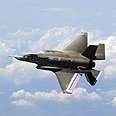
Report: US strikes on Iran would risk major war
New military assessment of feasibility of strikes on Tehran's nuclear facilities says likelihood of it igniting regional war growing
US military strikes on Iran would shake the regime's political control and damage its ability to launch counterstrikes, but the Iranians probably would manage to retaliate, directly and through surrogates, in ways that risked igniting all-out war in the Middle East, according to an assessment of an attack's costs and benefits.
The assessment said extended US strikes could destroy Iran's most important nuclear facilities and damage its military forces but would only delay – not stop – the Islamic republic's pursuit of a nuclear bomb.
Related stories:
- New Yorker: Bibi places Israel's future at risk
- France: Diplomatic solution needed for Iran crisis
- Barak: War – only as a last resort
"You can't kill intellectual power," said retired Army Lt. Gen. Frank Kearney, who endorsed the report. He is a former deputy director at the National Counterterrorism Center and former deputy commander of US Special Operations Command.
The report compiled by former government officials, national security experts and retired military officers is to be publicly released Thursday.
The report says achieving more than a temporary setback in Iran's nuclear program would require a military operation – including a land invasion occupation – more taxing than the Iraq and Afghanistan wars combined.
The assessment emerges against the backdrop of escalating tensions between Israel and the US over when a military strike on Iran might be required.
Israel is worried that Iran is moving more quickly toward a nuclear capability than the United States believes. The US has not ruled out attacking but has sought to persuade Israel to give diplomacy more time.
Israel views a nuclear-armed Iran as a mortal threat, citing Iran's persistent calls for the destruction of the Jewish state, its development of missiles capable of striking Israel and Iranian support for Arab militant groups.
Tehran insists its nuclear program is for peaceful purposes only.
An oft-stated argument against striking Iran is that it would add to a perception of the US as anti-Muslim – a perception linked to the US-led invasions of Iraq and Afghanistan and hardened by Internet-based video excerpts of an anti-Muslim film that may have fueled Tuesday's deadly attack on a US diplomatic office in Libya.
"Planners and pundits ought to consider that the riots and unrest following a Web entry about an obscure film are probably a fraction of what could happen following a strike — by the Israelis or US – on Iran," retired Lt. Gen. Gregory Newbold, an endorser of the Iran report and a former operations chief for the Joint Chiefs of Staff, said.
No overall conclusion
The report was compiled and endorsed by more than 30 former diplomats, retired admirals and generals and others who said their main purpose was to provide clarity about the potential use of military force against Iran.
They reached no overall conclusion and offered no recommendations.
"The report is intended to have what we call an informing influence and hopefully something of a calming influence, but that's something readers will have to answer for themselves," said Thomas Pickering, a former US ambassador to the United Nations who has held informal
contacts with Iranian officials as recently as the past few months.
Kearney said the assessment was meant to stimulate thinking in the US about the objectives of a military attack on Iran beyond the obvious goal of hitting key components of Iran's nuclear program.
- Receive Ynetnews updates directly to your desktop










